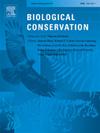Free organisms for bending the curve of biodiversity loss
IF 4.9
1区 环境科学与生态学
Q1 BIODIVERSITY CONSERVATION
引用次数: 0
Abstract
Up until now, conservation practices have not been very successful in halting the decline of biodiversity. However, nature conservation often focuses on restoring a fixed and stable state of biodiversity. This approach conflicts with our current understanding of ecosystems as open systems, constantly changing across various spatial and temporal scales. To find an alternative foundation of nature conservation, we focused on the preconditions necessary for an unhindered development of biodiversity. We argue that freedom from human interference for ecological agents - specifically organisms – serves as that precondition. We propose that freedom for organisms be chosen as the ecological sound and ethically justified foundation of nature conservation policy. This freedom includes: 1) Free access to resources and exposure to abiotic conditions, 2) Free interaction between organisms, and 3) Free movement in space and survival over time. By quantifying the extent in which freedom for organisms is violated, a metric can be developed to assess the success of conservation policies, and a target can be set for the future. The concept of freedom for organisms may also serve as the basis for formulating the rights of organisms and, ultimately, the rights of nature.
弯曲生物多样性丧失曲线的自由生物
到目前为止,保护措施在阻止生物多样性的下降方面还不是很成功。然而,自然保护往往侧重于恢复生物多样性的固定和稳定状态。这种方法与我们目前对生态系统的理解相冲突,生态系统是开放的,在不同的空间和时间尺度上不断变化。为了寻找另一种自然保护的基础,我们把重点放在了生物多样性不受阻碍发展的先决条件上。我们认为,不受人为干预的生态因子——特别是生物体——是这一前提条件。我们建议选择生物自由作为自然保护政策的生态健全和伦理合理的基础。这种自由包括:1)自由获取资源和接触非生物条件,2)生物之间的自由互动,以及3)空间上的自由移动和随时间的自由生存。通过量化生物自由被侵犯的程度,可以制定一个衡量标准来评估保护政策的成功,并为未来设定一个目标。生物自由的概念也可以作为制定生物权利的基础,并最终成为自然权利的基础。
本文章由计算机程序翻译,如有差异,请以英文原文为准。
求助全文
约1分钟内获得全文
求助全文
来源期刊

Biological Conservation
环境科学-环境科学
CiteScore
10.20
自引率
3.40%
发文量
295
审稿时长
61 days
期刊介绍:
Biological Conservation is an international leading journal in the discipline of conservation biology. The journal publishes articles spanning a diverse range of fields that contribute to the biological, sociological, and economic dimensions of conservation and natural resource management. The primary aim of Biological Conservation is the publication of high-quality papers that advance the science and practice of conservation, or which demonstrate the application of conservation principles for natural resource management and policy. Therefore it will be of interest to a broad international readership.
 求助内容:
求助内容: 应助结果提醒方式:
应助结果提醒方式:


